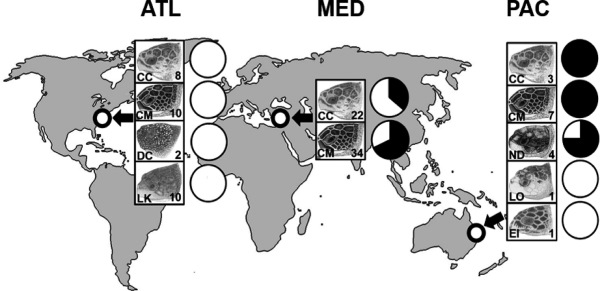Sea turtles around the world are threatened by microplastics. A new study revealed that over 100 animals from Earth's 2 oceans and the Mediterranean had microplastics inside their gut.
Sea turtles around the world are threatened by microplastics. A new study revealed that over 100 animals from the 2 oceans and the Mediterranean had microplastics inside their gut.
A disturbing discovery that only confirms how serious the problem is. Now present everywhere, even in the water we drink, microplastics are fragments whose length does not exceed 5 mm. Once dispersed at sea it is practically impossible to eliminate them.
Researchers from the University of Exeter and the Plymouth Marine Laboratory, which collaborate with Greenpeace, have found microplastics in 102 sea turtles in the Atlantic, Pacific and Mediterranean, belonging to all 7 existing species.
The most common particles were fibers potentially originating from clothing, tires, cigarette filters, and marine equipment such as ropes and fishing nets.
In total, over 800 synthetic particles were found in the 102 turtles involved. But the researchers only looked at part of each animal's intestines, so the total number could be about 20 times higher.

The necropsies were carried out on the turtles after death or after stranding and accidental capture. The study sites were North Carolina, USA (Atlantic), Cyprus (Mediterranean) and Queensland, Australia (Pacific). The multi-particle turtles were found in the Mediterranean - they are believed to have higher contamination rates than in the Atlantic or the Pacific - but the sample size and methodology of this study did not allow for detailed geographic comparisons.
"The effect of these particles on turtles is unknown", he said lead author Emily Duncan, of the University of Exeter's Center for Ecology and Conservation. “Given their small size, they can pass through the intestine without causing a blockage, as is often the case with larger plastic fragments. However, future work should focus on how microplastics can harm aquatic organisms. For example, they can carry contaminants, bacteria or viruses, or they can affect the turtle at the cellular or subcellular level. This requires further investigation ".
Not just turtles
Another recent study found the presence of microplastics also in scallops. What's more, scientists at the University of Exter have confirmed that over the years they have found microplastics in nearly every species of marine animal, from the tiny zooplankton at the base of the marine food chain to fish.
"This study provides further evidence that we all need to help reduce the amount of plastic waste released into our seas and keep oceans clean, healthy and productive for future generations," the researchers say.
The study was published in Global Change Biology.
READ also:
- The terrifying pictures of plastic ring pollution in beer cans (and how to fix it)
- Turtle freed from a plastic bottle attached to its back for years (VIDEO)
- Plastic is killing 40% of sea turtles, especially baby turtles
Francesca Mancuso


























